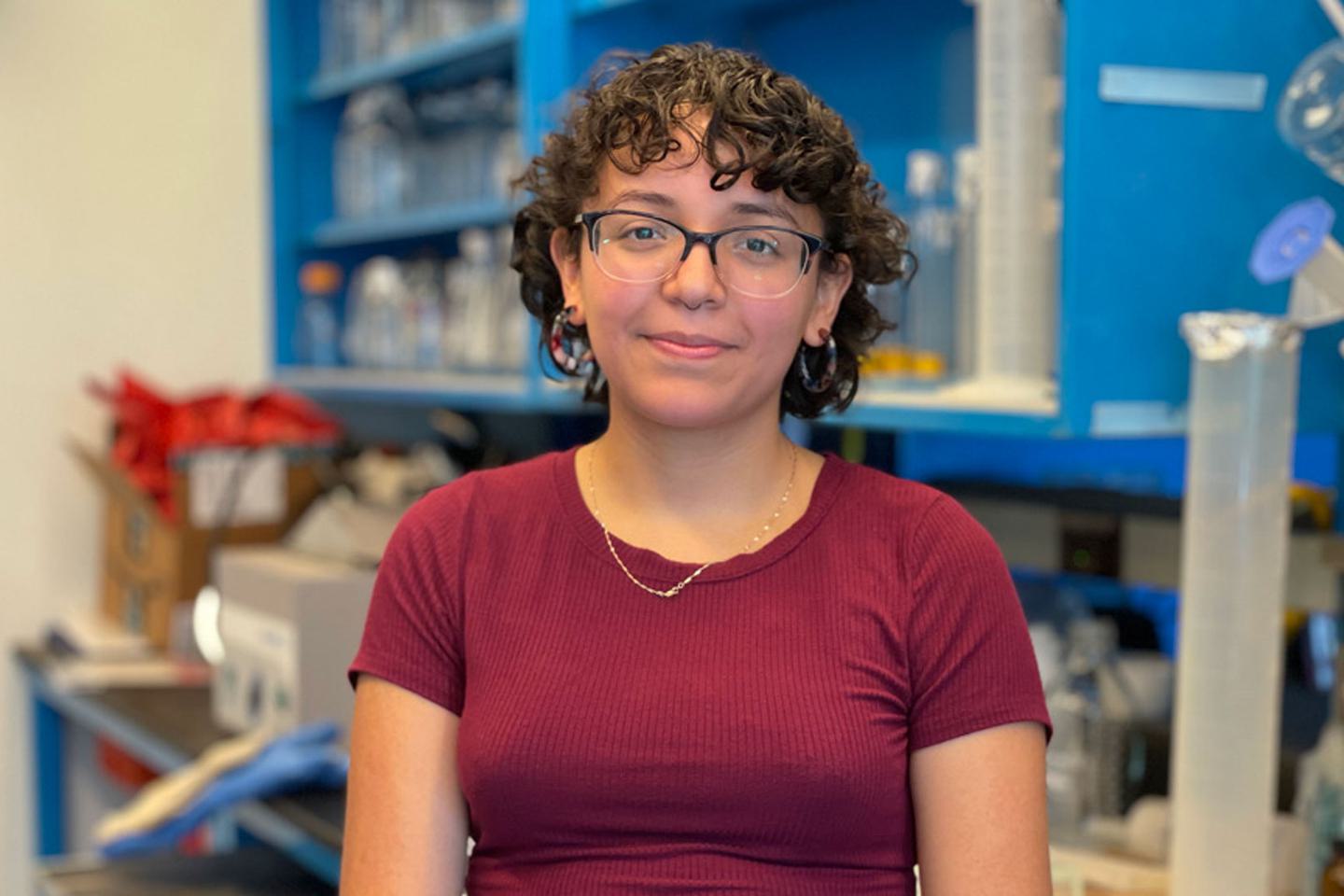On the door to Lab 325 in the Science Center, there is a Sesame Street-themed sign with Bert and Ernie on it that says “Tetel Lab,” and just beyond it, neuroscience major Cesiah Gomez ’22 uses a pen-like device to extract DNA swab samples, which she places in small, plastic tubes organized neatly on a red tray. Since this summer, the Tetel Lab has been Gomez’s workspace for her project with the Beckman Scholars Program, a highly selective research experience for undergraduate students across the country who excel in science. The scholars receive stipends for two summers and one academic year; at Wellesley, the funding can support up to four students per year. Gomez is one of 22 Wellesley students who have been named scholars since 1997. Here, she talks about her journey to becoming a Beckman Scholar, working alongside Marc Tetel, Dorothy and Charles Jenkins, Jr. Distinguished Professor of Neuroscience, during this unique hands-on experience, and her hopes for the future.
Why did you apply to be a Beckman Scholar?
Cesiah Gomez ’22: I thought it would be a great opportunity to be a part of a long-term research project as a student—I liked the idea of being able to contribute to something for more than a couple of months. I also was interested in doing a thesis in my senior year, and the possibility of getting funds to support that work reinforced my interest in applying. Looking at the Beckman program’s website and seeing how scholars are supported by the Beckman Foundation network was also something that hooked me in.
What is the focus of your research and project?
Gomez: When I submitted my proposal, I had the intention of participating in the continuation of a pilot study with Professor Tetel that started in the spring of 2021. This pilot, led by Dr. Kalpana Acharya, the postdoctoral researcher in his lab, investigated the effects of inulin, a type of fiber, on weight gain in female mice induced by a high-fat diet. We analyzed a lot of the data from that experiment this summer. What was surprising was that we did not get the results we expected and, as a result, needed to shift gears. As a continuation of this research and our findings, we are beginning a new project that looks at the effects of stress on the vaginal microbiome in mice and whether there is a correlation between the composition of the vaginal and gut microbiomes.
What has been your favorite part of this experience?
Gomez: My favorite part of my work so far has been being able to see a research project through from start to finish, and learning how to plan and modify experiments as they are going on. Professor Tetel fosters a supportive environment for learning in the lab, and has connected me with amazing people like Dr. Acharya, who has helped me learn many new skills, as well as collaborators at the Mayo Clinic. This has been an invaluable opportunity to connect different perspectives and connect with new mentors. Professor Tetel’s mentorship, along with that of others , has led me to be able to lead this new project of my own. This is not something I ever expected to do in undergrad! Nothing really ever goes exactly as expected, and that always keeps things interesting.
What has been the most challenging part of this experience?
Gomez: One of the challenges has been learning the jargon for the field of neuroendocrinology, as well as making a (tiny) dent in reading the literature in that field relevant to our studies. It can be difficult to digest new visualizations of data and methodologies, but I’ve had amazing support from the other lab members, as well as Professor Tetel and Dr. Acharya.
How has your relationship to your major changed?
Gomez: I’ve learned that there is a vast amount of research that can be done within neuroscience, and even within the subfield of neuroendocrinology. It really feels like you can never run out of things to study, which keeps my curiosity going. I always knew I wanted to study medicine in the future and conduct health policy research, but through my lab experience, I’ve learned that I’d like to continue doing research in conjunction with my career in the future.
What’s next for you?
Gomez: The program is a guaranteed two summers and one academic year of research with funding, so my plans are to continue my work the summer after I graduate! Having an opportunity ready to go is great, and I’m grateful for the longevity of the project as it gives me an idea about what field I might want to pursue a research position in for my gap year before pursuing medical school. One thing that drew me in about the Tetel Lab and this project is that it emphasizes women’s health and the specific effects in females, which have been historically excluded from clinical trials. I think that really translates to my future goals of highlighting inequities in health care for minoritized groups, and finding a way to create more comprehensive care for these groups.
